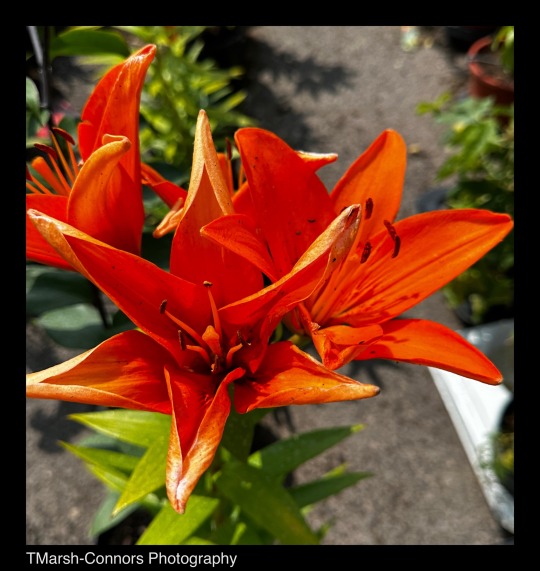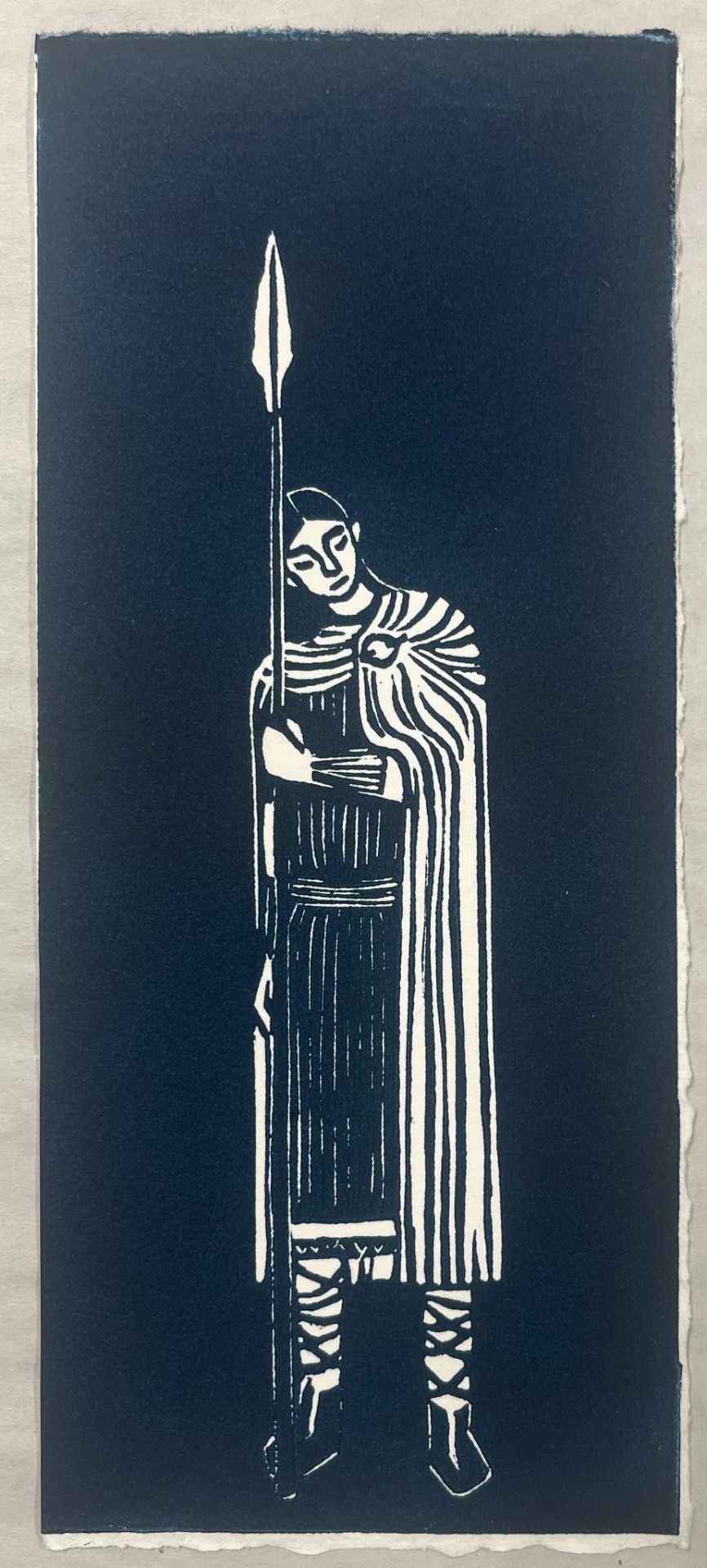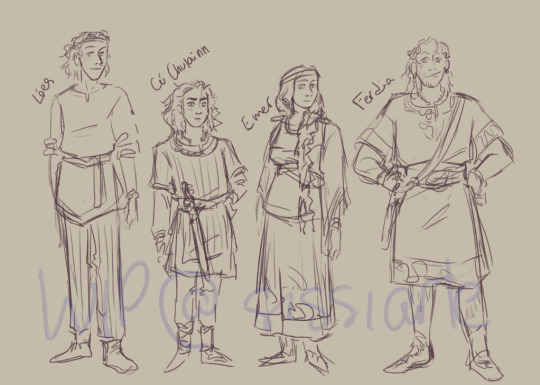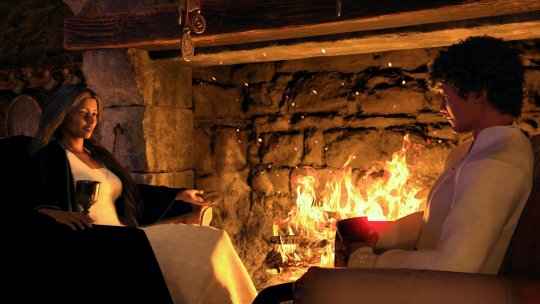#for god and ulster
Text





Orange Lilies
Lilium bulbiferum, common names orange lily, fire lily, Jimmy's Bane, tiger lily and St. John's Lily, is a herbaceous European lily with underground bulbs, belonging to the Liliaceae.
#today on tumblr#orange#orange lily#for god and ulster#history#flowers#12th July#freedom#new blog#truth#picture blog#summer#NorthernIreland#Belfast#Derry#Londonderry#Giant'sCauseway#Carrick-a-Rede#TitanicBelfast#GameOfThrones#StPatricksDay#PeaceProcess#IrishHistory#IrishCulture#CelticTraditions#CausewayCoast#IrishMusic#MourneMountains#DarkHedges#CulturalHeritage
1 note
·
View note
Text

hi more ulster cycle art based on this passage: “From the Monday after the feast of Samain at summer’s end to the Wednesday after the feast of Imbolc at spring’s beginning, Cúchulainn never slept — unless against his spear for an instant after the middle of the day, with head on fist and fist on spear and the spear against his knee” - táin bó cúailnge tr. thomas kinsella
#i feel like when i read the tbc i constantly seesaw back and forth between “haha he’s only 17” and “oh my god he’s only 17”#this is one of the latter moments#my art#art#me#ulster cycle#tain bo cuailnge#cu chulainn#linocut#irish mythology
300 notes
·
View notes
Text

Cú Chulainn and the three people who want to be buried with him :) I'm very happy that I'm finally settling their designs !!!!!!
#tain bo cuailnge#cu chulainn#laeg mac riangabra#ferdia#fer diad#ferdiad#my god i never know how to tag his name#emer#there has to be a more specific way to tag her#ulster cycle#wip#sissiarte
94 notes
·
View notes
Text
Cu Chulainn: Just want to wish Ferdiad the most special, magical birthday ever. I love you with all my heart.
Cu Chulainn: Also, happy birthday to my wife, Emer.
#canon#Cu Chulainn#ferdiad#Cú Chulainn#emer#irish mythology#ulster cycle#irish gods#irish heroes#incorrect irish mythology#incorrect irish gods#incorrect irish heroes#incorrect ulster cycle#incorrect mythology#mythology#s: vancityreynolds (twitter. or X i should say)#queuetzalcoatl
15 notes
·
View notes
Text
i do think it's kind of funny that ao3 seems to have made a blanket change to all the "mythology" tags to make them "religion and lore" (not a good change) EXCEPT the "arthurian mythology" tag, which remains intact despite a Number of people trying to get that one reworked or at least different wrangled for ages. they're like "we're taking mythology away from all the contexts where it might be applicable. and leaving it in the context where it's dubious. this is a sensible change"
#Choices Were Made#genuinely very funny that they left that one specifically#extremely annoying that they changed the others#especially the (dubiously correct) use of irish and welsh#when the Norse tag etc does not use any language except english#so it feels weirdly othering#especially because the exact translation of the irish doesn't match the english#like béaloideas is not simply 'lore'. it is far more specific than that.#so it doesn't feel like a carefully thought through change#not to mention “ancient” which. crucially. they have not used for the norse tag#so it's only the irish and welsh material that's ancient huh?? those are not living traditiona to you huh???#it's arbitrary inaccurate and problematic#also can they stop making the Ulster Cycle tag redirect into the general tag please !!!#that's like making captain america redirect into the general mcu tag... it's a venn diagram not a circle...#i want to be able to look for other ulster cycle fics and not scroll through twenty pages of 'assorted fandom plus fairies'#which is what dominates the irish mythology as-was tag and why i never found it browseable#but the new one is like. no actually i am not writing fic of 'ancient irish religion and lore'#that's not at all what I'm writing about#i am writing about medieval irish literature#'irish mythology' was never my favourite tag but god it was better than this
18 notes
·
View notes
Text
Yes win my Irish folklore podcast of choice has an ep on the curse of macha! Was thinking abt it all class <3
#yes i have shit to be doing. shut up#basicslly abridged version is that macha is goddess of sovereignty n she becsme human to be some lads wife#and she always got the chores done rlly quick bcos goddess and thus her husband was bragging about her#n her husband said 'lol i bet that u could outrun a pack of horses and i have money on it so go do that'#and macha (heavily pregnant with twins) said WHAT THE FUCK#and she did it and she won but all the running plus being pregnant didnt mix well#and she either miscarried or fell on the ground and gave birth then and there w no help#and she went 'FUCK YOU YE USELESS MEN LETS SEE HOW YOU LIKE IT'#and she cursed it so that whenever the grown men of ulster needed to fight theyd be struck down by pain equivalent to childbirth#and that laid the groundwork for cú chulainn's role in the cattle raid of cooley#bcos ulster got in a war n all thr grown men were bedridden w pain so queen medb was like 'ah shit what do i do now'#n then cú chulainn showed up and he was only a child but god could he kill a bitch so ulster didnt get too slaughtered#and then the rest of the táin etc etc#for comparison ive seen people say cú chulainn and the táin are to ireland what achilles and the iliad are to greece#im fully talking out of my ass btw this is all from memory. but its fun innit
13 notes
·
View notes
Text
Cú Chulainn: *falls down the stairs*
Ferdiad: Are you okay?
Emer: Stop falling down the stairs!
Morrigan: How’d the ground taste?
#mythology#celtic mythology#irish mythology#celtic gods#celtic goddess#irish gods#irish goddess#ulster cycle#the tain#the táin#cú chulainn#cu chulainn#setanta#ferdiad#emer#morrigan#cú chulainn x ferdiad#cu chulainn x ferdiad#setanta x ferdiad#ferdiad x cu chulainn#ferdiad x cú chulainn#ferdiad x setanta#cú chulainn x emer#cu chulainn x emer#setanta x emer#emer x cu chulainn#emer x cú chulainn#emer x setanta
23 notes
·
View notes
Text
Relistening to 'We sell any monk' and the thing about selling from Dublin (makes sense!) to as far away as Italy (also makes sense!) makes me want to have a very silly little medieval AU. They end up in the Emirate of Sicily - as a bunch, though being sold separately and still ending up in the same place may be even better.
Anyways, Michele lives there and meets the unfortunate souls, whose backstory is "Yeah, no, not monks - " "We're the only sons you see -" "And I never was particularly holy or called to Christ anyways, I just lived around a monastery -" "You've seen that fecker, you expect his sister to be pious? No, no nun either." "Anyways. We're from around Dubh Linn and uh. You know. Thought a raid couldn't hurt." "Oh yeah, that were your words, weren't they!"
This goes on for another five minutes. Especially if Michele introduces himself and someone, in true Irish fashion, is like "Oh, I met someone from Byzantium on my way here. Do you know a Tiffany from Ravenna?"
#slavery is a very serious issue however let me live i like historic comedies sometime#beablabbers#storie nostre#miche#harry#charlie#soph#paddy#GOD fucking knows how Paddy ended up in the area around Dublin from feckin Donegal#not even from the close end of Ulster to Leinster!!!#but now he's in Sicily anyways. typical monday
4 notes
·
View notes
Text
new character tags ( blorbos first ) ^-^
📖 * guinevere pendragon. ‣ queen of camelot.
📖 * cassandra of troy. ‣ princess prophetess.
📖 * helen of sparta. ‣ the most beautiful woman.
📖 * maid marian / william scarlet. ‣ lady of the merry men.
📖 * saito momoka. ‣ wisteria & peaches.
📖 * yuuki cupid saito. ‣ last hope of humanity.
📖 * percival. ‣ the dove knight.
📖 * gawain. ‣ knight of the sun.
📖 * agravain. ‣ knight of iron.
📖 * sieg. ‣ balmung's heir.
📖 * siegfried. ‣ dragon slayer.
📖 * emiya shirou. ‣ hero of justice.
📖 * cú chulainn / sétanta. ‣ hero of ulster.
📖 * fiore forvedge. ‣ yggdmillennia's true talent.
📖 * jeanne d'arc. ‣ holy maiden.
📖 * rama. ‣ brahmastra.
📖 * asterios. ‣ chaos labyrinth.
📖 * nursery rhyme. ‣ born of fairytales.
📖 * bazett fraga mcremitz. ‣ god's holder.
📖 * waver velvet / lord el-melloi II. ‣ cringefail professor.
📖 * grey. ‣ grave for you.
📖 * charlemagne. ‣ joyeuse ordre.
📖 * name. ‣ tag.
#🌠 * out. ‣ welcome to the cringe and failzone.#🌠 * blog updates. ‣ god help us all.#📖 * guinevere pendragon. ‣ queen of camelot.#📖 * helen of sparta. ‣ the most beautiful woman.#📖 * cassandra of troy. ‣ princess prophetess.#📖 * charlemagne. ‣ joyeuse ordre.#📖 * grey. ‣ grave for you.#📖 * waver velvet / lord el-melloi II. ‣ cringefail professor.#📖 * bazett fraga mcremitz. ‣ god's holder.#📖 * nursery rhyme. ‣ born of fairytales.#📖 * asterios. ‣ chaos labyrinth.#📖 * rama. ‣ brahmastra.#📖 * sieg. ‣ balmung's heir.#📖 * jeanne d'arc. ‣ holy maiden.#📖 * cú chulainn / sétanta. ‣ hero of ulster.#📖 * saito momoka. ‣ wisteria & peaches.#📖 * maid marian / william scarlet. ‣ lady of the merry men.#📖 * yuuki cupid saito. ‣ last hope of humanity.#📖 * percival. ‣ the dove knight.#📖 * gawain. ‣ knight of the sun.#📖 * agravain. ‣ knight of iron.#📖 * fiore forvedge. ‣ yggdmillennia's true talent.#📖 * emiya shirou. ‣ hero of justice.
3 notes
·
View notes
Text
I always excuse my autism accent on the fact my dad is irish, which is true! it's just that... he doesn't have an irish accent. bc he deliberately gave himself a neutral english accent as a teenager.
#I did get drunk visiting family in norn iron several years ago and slipped into Incomprehensible Ulster Scots#i spent like 12 hours drinking and talking and my then-gf could barely understand me when we skyped before I went to bed#most of my childhood summers were spent there and several xmases so it did affect the slang I use and how I pronounce certain words#but the rest is All Autism babey#a hairdresser asked about my accent today which was funny bc I was in my literal hometown. thank god I prepare my masks in advance
1 note
·
View note
Text
No thoughts only Cú
#Cú Chulainn#irish mythology#ulster cycle#shitpost#listen this is my favourite mass murdering Demi god who dies young#ramblings
4 notes
·
View notes
Text

“I have never made an inflammatory statement in my life”
Ian Richard Kyle Paisley was a Northern Irish loyalist politician and Protestant religious leader.
Born: 6 April 1926, Armagh, Northern Ireland
Died: 12 September 2014, Belfast, Northern Ireland.
#today on tumblr#quoteoftheday#quotes#europe#freedom#history#truth#deep thoughts#philosophy#quotations#northern ireland#british#loyalist#preacher#prod#true prod#protestant#faith in christ#for god and ulster#jesus#church#Ulster#the troubles#political#uk politics
0 notes
Note
I've been enjoying the recent Middle Kingdoms works, and was especially taken by the ritual hospitality in "The Landlady". It seemed reminiscent of traditional Irish phrases I've encountered translated into English. If there any influence? To what degree has Ireland leaked into your understanding of the Middle Kingdoms and their cultures?
Re: the Irish influence: there's occasionally some effect on casual idiomatic usages in characters' general conversation, yes. In fact, while doing some editing work on TOTF3: The Librarian just a day or three ago, I caught Freelorn's edgy friend-who-killed-him-that-one-time, Sem, using phrases that unquestionably were not just Irish-originated, but Ulster-originated. :) (And plainly this is @petermorwood's fault. But since the character seems comfortable with the usage, and from where I'm sitting it sounds right for him, I'm not going to mess with it.)
As regards Irish influence on the Kingdoms' formal hospitality-language and culture, though, I'm not seeing much evidence of that. Not that I haven't done a fair amount of reading about Brehon law and other adjacent matters over time as a matter of casual research. But none of that seems to be reflected in any of the notes I made on the Kingdoms' cultures while developing them.
The connection I am pretty sure of is to translations of stock epithets and phrases (and the presence of various general concepts and actions) associated with the practice of formal xenia in ancient Greece, particularly as described in the Odyssey.
In particular, the Kingdoms' worldview seems to share a core concept with the ancient Greek one as regards xenia. This is the idea that personified Deity is walking around in the world, making itself responsible for the protection of people who call on others' hospitality. Both cultures have the idea that people's behavior may be tested by the gods—or God(dess)—to see how well they're obeying the rules set out regarding the welcome properly due to strangers and those in need.*
In the Kingdoms, the concept has had what seemed to me like a more or less logical expansion into the relationship between the heads of organized Houses—what we could equate with local familial lordships, though the actuality in the Realms is a lot less patriarchially hierarchical and more complex—and the people who come to hold land of/from the Houses' heads.
So it made sense to me that there would be basic gestures and phrases that express agreement to various aspects of the contract between a House's head and their holders. Since both writing and literacy died off during that alternate Earth's domination by the Dark, and had to be revived and relearned after its destruction, this contract was for a long time always verbal. Over the centuries, ritualized concrete practices—the exchange of bread and water between Holders and head of House, for example—grew up alongside the spoken content to make it plain that everybody understood the nature and intention of the contract. These, too, I derived from material in the Odyssey and other works of that period: situations, for example, where simply eating something that someone else has given you is itself confirmation that the contract between host and guest is in place and working.
Anyway: thanks for the question. Hope this helps!
*But then readers of the MK books will of course recognize this as the kind of thing the Goddess already does in Her world—not being one of those lurking-and-skulking sorts of deity who leaves you wondering all your life about whether they're real or not. Her basic contract with Her creation already contains the concept that everybody gets to meet Her personally at least once; and—either in Her proper person, or in the form of other people—sometimes more than once. Because yeah, She's busy... but what's the point of being a deity if you don't have the time to sit down with your creation for drinks every now and then...?

52 notes
·
View notes
Text
Twin shirts for me and a friend which say ASK ME ABOUT THE HISTORY OF EIGHTEENTH CENTURY ULSTER PRESBYTERIAN POLITICAL RADICALISM and PLEASE FOR THE LOVE OF GOD DON'T ASK HIM ABOUT THE HISTORY OF EIGHTEENTH CENTURY ULSTER PRESBYTERIAN POLITICAL RADICALISM respectively
78 notes
·
View notes
Text
God i love museums hey anyone wanna go to the ulster America folk park with me
57 notes
·
View notes
Text
[“The elephant in the room of immigration is the US military invasion and annexation of half of Mexican territory that spanned more than two decades, 1821 to 1848. During that same period, the eastern half of the United States was being ethnically cleansed with the forced removal of Native nations. White supremacy and settler-colonial violence are permanently embedded in US topography. The United States has a foundational problem of white nationalism that wasn’t new with Nixon or Reagan or Trump. White nationalism was inscribed in the founding of the United States as a European settler-colonial expansionist entity, the economy of which was grounded in the violent theft of land and in racial slavery, and with settlers armed to the teeth throughout its history, presently numbering over three hundred million people with the same number of firearms in civilian hands. Yet only a third of the population own those guns, an average of eight each, and 3 percent of the population own 50 percent of the guns in civilian hands. A great majority of this minority of gun owners are white men who are descendants of the original settlers, or pretend to be. These descendants are most obvious in the former Confederate and border states but actually are also scattered in clusters and communities in all parts of the United States. They are the latter-day carriers of the United States’ national origin myth, a matrix of stories that attempts to justify conquest and settlement, transforming the white frontier settler into an “indigenous people,” believing that they are the true natives of the continent, much as the South African Boers regarded themselves as the “true” children of Israel, powered by Calvinism; the Calvinist Scots settlers did in Ulster, Ireland; or Jewish settlers in Palestine—all established by an imaginary God-given covenant making them the chosen peoples.”]
roxanne dunbar-ortiz, from not a nation of immigrants: settler colonialism, white supremacy, and a history of erasure and exclusion, 2021
106 notes
·
View notes